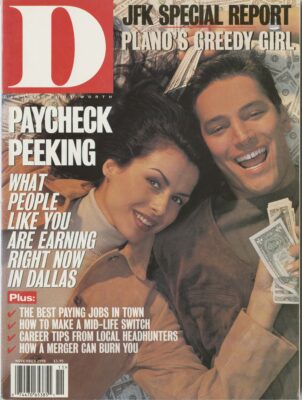When Ed Baumann ihinks of his estranged wife, Lauren, two images come to mind. One is of Lauren ensconced in her luxurious office, dressed in a power suit with a short skirt, wheeling and dealing on the phone-to customers, real estate agents, bankers. Sharp with numbers, Lauren Baumann worked long hours, determined to make her mortgage business grow. “She was real smart, real creative with the mortgage business,” Ed says. “She’d gel loans through that I couldn’t understand how she got these people to qualify. But as far as doing anything illegal? No.”
The other Lauren is the overripe vixen poured into a black lace gown with alarmingly low cleavage, posing in boudoir shots to show off her new breast implants, vamping in tight leather in a vanity video.
Now, as 47-year-old Ed Baumann surveys the ruins of his life in Piano’s fast lane, the bewildered former millionaire ruefully wonders how far back he should have known that 30-year-old Lauren was a thief. Long before the mysterious business dealings and lavish overspending, the flashy parties and the new breasts, there’d been the $2,000 bad check she made out to him after they got engaged, the forged credit cards, the hidden account statements, the suspicions about a secret lover.
Instead, blinded by love or bad judgment or both, Ed hung on until he had no choice but to help federal authorities set a trap for his wife, closing down her mul-ti-million-dollar Ponzi scheme and possibly setting up Mrs. Baumann for a trip to prison.
As he sits alone in his cavernous Piano Xanadu, which he soon will be forced to put on the market, and ponders how to rebuild his own ravaged reputation, Ed Baumann is a confused and bitter man.
“I tried everything I could,” he says. “She wiped me out.”
“Oh, honey, I have to have it,” Lauren squealed. The 1990 Mercedes 300 CE, perched like a bonbon on a plate in front of a Southern California car dealership, was a unique shade of teal. Lauren spotted it as they were driving by in February 1992 and, in that instant, had to possess it. The Baumanns had been married a little less than a year, and Lauren was five months pregnant. The price was $40,000. Ed paid cash.
After all, he could afford it. After working for years as the territory sales manager of a medical supplies company, in October 1991 Ed had hit the jackpot: The company went public, and his stock options were worth about $ 1 million. His life was on the right track; not only was Ed a millionaire, he had a pretty wife 17 years his junior and a baby on the way.
But Ed didn’t really like California or the mortgage business. He wanted a place to raise a family, a place where he could start his own company. In late 1992, after their first son was bom, the Baumanns, attracted by Texas’ entrepreneurial culture, moved to Las Colinas.
In April 1993, they found a lot on Twin Lakes Way in Lakeside (off Parker Road near Preston). At $210,000, the land cost more than Ed wanted to spend, but it was almost an acre, next to a creek and a pond. They signed a contract with a homebuilder; for a down payment, Ed took $157,000 from his stock margin account at Schwab.
The house ended up being 6,200 square feet, with a three-car garage and a guest house. Lauren found a decorator, and they began to make changes and additions. To make payments easier while he traveled on business, Ed added his wife as a signatory on his account at Schwab. When he finally added up the bills, the house had cost $766,000.
Though he thought Lauren had gone overboard on die decorating and additions, Ed didn’t complain too much. “I felt we ’d get our money out of it,” he says. The four-columned edifice was something more than a house; it became the symbol of his hard-earned success.
For Ed, it may have been a culmination. But Lauren was just getting started.
She decided to put her mortgage experience to work, incorporating Accelerated Funding Mortgage Corp. Her idea was to act as a retailer to the booming Piano market, handling the paperwork and then sending her customers’ loan packages to wholesale lenders such as Sunbelt Savings for actual funding. In a few years. Accelerated was processing about S3 million in loans per month. Lauren toiled long hours. When the time came to give birth to her second son, she had the baby on a Thursday and was back at work on Monday.
In a flourishing market the money flowed, and Lauren quickly got used to it. Her weekly florist bill was $2,000. Dropping $6,000 to $8,000 at Neiman Marcus, Nordstrom, or Bachendorf’s on a Saturday wasn’t unusual for her.
The Baumanns had become good friends with their Piano neighbors: Gary Hartstein, who had made his money in adult video stores; Paul and Wendy Morse, daughter of Wendy’s Hamburgers founder Dave Thomas; and, especially, Pam and Brian Greninger. who owned Service Rubber Group-Lauren loved to buy her friends expensive gifts and to throw lavish parties. For a bridal shower for her masseuse, she bought a couple of cases of Dom Perignon and hired a former La Bare dancer to chauffeur the guests in a limo. For her oldest son’s fifth birthday, Lauren threw a Jurassic Paik-themed bash, com-
As early as 1994, the Baumanns’ marriage was shaky. Ed’s fledgling company had failed to take flight, while Lauren had more business than she could handle. So Ed pitched in at Accelerated Funding. But proximity did nothing to relieve the strains. They fought often about money- mostly about her spending his without telling him or lying about it afterward.
“I was made out to be the bad guy,” says Ed. “People thought I had an anger problem.” He tried to take Lauren’s name off the Schwab account, but she refused to sign the consent documents. On a Thursday night in December 1994, after discovering that Lauren had taken $28,000 without his authorization, Ed got drunk and slapped her. demanding to know what she did with the money. The next Monday, Ed checked into Charter Hospital in Piano, spending a week in alcohol rehab.
But the money problems continued after his rehab. Ed couldn’t understand how Lauren could drop $25,000 on clothes in one day. “You’re going to wipe out all die stock in our Schwab account in a year or two.” he told her after discovering one spending binge. “Oh. I’m making so much money I’ll be able to pay you back.” she said.
As Lauren’s business grew, she seemed to become more obsessed with her image. In May 1995. after she complained that she needed a better car to court clients, Ed obliged with a leased $75,000 Jaguar. That summer, though she weighed about 125 pounds, she announced that she needed liposuction. Adamantly against it, Ed refused to drive her to the hospital. Undaunted, Lauren had her receptionist drive her there and back. A year later, she was back at the plastic surgeon, this time for size-D breast implants.
On Father’s Day 1996, Lauren presented her husband with a slickly produced video, praising his strengths as a husband and dad, featuring photos and videos of his two blond sons. Then she led him to the Greningers’ driveway. Hidden inside the neighbors’ garage was a new red Porsche Carrera. The sticker was still on it: $75,000. Shocked and thrilled, Ed turned to Lauren, who promised that she had paid cash for it out of her business.
Ed says he chose to believe her.
How and when the scam really began is not exactly clear. But the first investor was a well-to-do retired businessman named Ronald Unger, who went to Lauren in 1994 to finance a mortgage. Quick with numbers, Lauren noticed a losing stock account among his assets and pointed out that the broker was inept. On investigation, Unger discovered he was more than that and obtained a settlement from the brokerage house. He was now willing to listen to anything Lauren recommended.
“She said she could do better for me than my stock market investments,” Unger says. Lauren explained that her husband Ed was buying distressed properties, fixing them up, and selling them. She was loaning money at high rates for the construction work, secured with second liens on Ed’s property, Lauren insisted it was legal. (In fact, Lauren was not an officer in Ed’s company; any liens she put on those properties were illegal and, according to Ed. unauthorized.)
Unger gave Lauren a little money, which she invested, returning a “fee” for the use of the money and interest for a total return of 35 to 40 percent. So he gave her some more.
“My problem became thai I never took any principal back,” says Unger. “I kept rolling my principal over.” Over a period of time, he introduced a dozen or so people-mostly close friends-to Lauren’s program. Word-of-mouth brought other investors, including Mike Cul-well. of Culwell & Son, Vickie Mox, a high-powered Piano real estate agent, and psychologist Xandreya Zigel.
Her approach was never pushy or aggressive. “She was very subtle about it,” says one investor. “It was take it or leave it.”
As investors’ money poured in, Lauren’s shopping sprees became more extravagant. One day in April 1997, she dropped $27,170 at Neiman Marcus. The Baumanns’ marriage-the alcoholic and the shopaholic-began to collapse.
Lauren told people that Ed was often physically abusive; she shows photos Pam Greninger look of deep bruises on her thighs and arms. Ed denies that he beat her, but admits that once during this period he slapped Lauren, threw her down on the floor, and sat on her during an argument over S 100,000 she had taken from the Schwab account without his knowledge.
At one point, Ed left for three days; he decided against filing for divorce. “I would have, if we didn’t have two kids,” he says. But they were still husband and wife; early that fall, Lauren got pregnant. And Lauren’s Accelerated was still funding a few of Ed’s deals.
Trying to figure out what was delaying some of those closings, Ed walked into Lauren’s office one day in the fall of 1997 and noticed a piece of paper on her desk. On Accelerated letterhead, under her name, it described a program offering private investors amazing returns. A 45-day investment of $51,000 would bring a $5,800 “fee,” plus 11 percent interest per diem for a 103 percent annual return. Investors with $210.000 could earn a $63,800 fee plus 11 percent interest, for a 193 percent return.
“What are you doing. Lauren?” he asked.
“That’s my new investment letter.” she said proudly, explaining thai she was putting together investor pools for refinancings.
Ed could see at once that she was promising unrealistic returns. “How can you do this?” he asked. “It’s going to blow up in your face.”
“Look, I’m the one making the money this year,” Lauren said, furious. “The investor letter is bringing in big money. Don’t tell me what to do.”
Lauren had informed Ed that she wanted to give a Christmas party on Dec. 6, and that it would cost $ 15.000 to $20,000. Two weeks before the party, workers showed up to build a plexiglass floor over the pool. The theme was a beach Christmas. A truck dumped sand on the lawn and planted wooden statues of pink flamingos and Jerry Garcia drinking a pina colada.
On the night of the party, crews began arriving to set up a piano player, a band, and a fortune teller. The head chef of the Fairmont Hotel prepared dinner. Entertainment included a kilted Scotsman to pour Scotch and tell ribald stories, two Colombians to hand-roll cigars, and professional dealers to run casino tables, where guests could gamble for prizes like dinner at the Mansion.
“I was walking around and realized, ’This is costing a hell of a lot of money.’” says Ed. Dressed in a tuxedo, he went upstairs and found Lauren, squeezed into an extremely low-cut purple dress, wearing $300,000 emerald earrings she had rented for the night. Lauren insisted that her party planner, an investor, had made a lot of money with her and was paying for most of the party. “My wife’s a pathological liar, and here I am still believing her,” Ed recalls ruefully.
About 100 guests, mostly investors, ale, drank, and danced until after midnight. The price tag for the party, yard decorations, and a separate kid’s party: about $215,000. But from Lauren’s viewpoint, it may have been worth it. After the party, even more money flooded into Lauren’s “investment program.” The owner of a CPA firm invested $750,000. Two brokers from Dean Witter started referring their clients.
“We adored Lauren,” says one female investor who became a close friend. “And we trusted her.”
Besides, she looked the part of the high-finance high-roller. “She drove a $75,000 Jaguar,” says linger. “Her husband drove a Porsche, She lived in a magnificent home. She was not the average little working girl.”
Ed came into the office one day the first week of February 1998 to find his wife screaming into the phone at her banker. The bank had grown concerned about the hundreds of thousands of dollars flowing through her accounts and put a temporary hold on her activity. Her checks to investors were bouncing.
“I knew that day what was going on,” Ed says. He confronted Lauren: “You’re doing a Ponzi scheme.”
“I don’t even know what that is,” Lauren said. He told her: She promises high returns to investors, then uses their money to pay off previous investors. With no real income or assets other than fresh money from new investors, the pyramid eventually collapses.
Ed told Lauren she had to go to those investors to whom she’d paid big “returns,” get that money back, and then use it to pay off everyone’s principal. “You’d better shut this thing down,” Ed told her.
“I can’t do it,” Lauren wailed. “I’ll lose my credibility. I’ll lose my investors. I’ll have to go back to doing loans.”
Unable to convince her to quit the scheme, realizing that people would believe he might be a crook, too, Ed decided he needed proof of his suspicions. He asked a contractor, a former private investigator, to help, and he started looking through Lauren’s files when she wasn’t around, Ed says he found illegal second liens she ’d put on half his properties. From records, it appeared that by the spring of 1997, she was taking in $300,000 to $400,000 a month. In October 1997. she took in $929,000. In December, the total was more than $1 million.
In her Jaguar, he found something more personally shocking: a fantasy music video of Lauren dressed up in $2,400 worth of North Beach leather, vamping a macho biker on a Harley-shot by the same photographer who did his Father’s Day video. She’d hired the actors and paid the photographer $2,100 to produce her waJk on the wild side.
Then Ed found her mobile phone bills, which showed Lauren talking to Brian Greninger 10 to 12 times a day. Greninger had left his wife two months earlier. Lauren rarely came home before 9 or 10 p.m.
“I knew they were having an affair,” Ed says. He moved out.
Ed’s divorce attorney took one look at the material and told him what he really needed was a good criminal defense attorney. He and Lauren were married; they officed together. Who would believe he wasn’t involved in what apparently was a criminal scheme to defraud? Ed went to lawyer Jay Ethington, who recommended “going postal,” and began secret negotiations with the U.S. Postal Inspector’s Office (which investigates mail fraud). In late March or early April, Ed agreed to gather evidence against Lauren for the federal government.
Lauren hadn’t slowed her pace. More money than ever was coming in. In February, about Si million; in March, $1.5 million. Then, during the first 12 days in April. $ 1.2 million. (She took a break on April 10 to have her baby.) Brokers from Dean Witter, Everen Securities, and Merrill Lynch brought in people to hear Lauren’s pitch, all eager to give her their money for the promised 157 to 279 percent return. (One investor received 409 percent.)
Meanwhile, Lauren had figured out that Ed was up to something; she hired a former FBI agent to install defenses-trip alarms on file cabinets, video cameras running 24 hours. Her efforts may have been an attempt to intimidate Ed, but nothing is more intimidating than the threat of a jail sentence. And anyway, Ed still had a key to the office. On the night of April 23. he sneaked in and found, in a locked file, a document showing $400,000 from one investor immediately being wired out to six others. It was the one piece of paper the federal investigators had told him they needed. Ed’s spy game was over.
On May 19, the Securities and Exchange Commission, get-ling wind that really big money was about to come in, filed an injunction against Lauren’s companies, shutting her businesses down and freezing her bank accounts. Ed says he’s broke; the money he made in the medical supply company is gone. The Twin Lakes dream house soon will be up for sale. Lauren’s half of the proceeds will go to the receiver appointed to liquidate the assets to repay investors.
The SEC discovered that Lauren kept virtually no records, but by tracing bank transactions officials figured out that from Jan. 1,1997 to May 19,1998, she took in $9.6 million from 80 investors-many were sophisticated people with lots of financial experience. “They got beguiled by appearances,” says Harold F. Degenhardt, district administrator for die SEC. “They [the Baumanns] wore their money, drove their money, and lived in their money. People should have asked some serious questions.”
One big question remains: Where did it all go? She disbursed $6.9 million to investors, but that leaves $2.7 million. “We allege in our papers that a lot of the money was spent on personal expenses, but that’s one of the things the receiver is doing now, tracing all of the money,” says SEC spokesman Spencer Barasch. The SEC alleged that a lot of the money went to Greninger: a $137,500 Mercedes and $60,952 in furnishings for his apartment. Lauren spent $95,589 on jewelry for herself and friends. On May 9,1998, right before she got shut down, she spent $29,715 on domes at Lilly Dodson. The federal court entered a “repatriation” order, requiring her to return any assets outside the U.S.
Lauren insists there is no money in offshore accounts. She’s moved to a rent house, but she’s still in Piano, working as a loan originator and trying to pay her bills, awaiting news of whether she will be criminally indicted. She denies running a Ponzi scheme, although she admits she made “mistakes.” She contends it was really Ed’s demands for money for his business-and his determination to keep her in the disastrous marriage–that caused all the problems. But a friend says, “It just goes to show what a woman will do to live in a big house in Piano.”
Lauren Baumann sits on her couch in early September, feeding her youngest child, Seth. The once-black edifice of hair is now a startling blond. She flashes a dazzling smile and says the hair switch, and an unfortunate experiment with self-tanner, led to a rumor that she is planning to flee the country.
“I want to accept responsibility for what I unknowingly did wrong,” she says. “1 have integrity. I’ve cooperated completely. My sole intention is that every investor gets back every dime.”
And who wouldn’t believe her?
Related Articles

Hockey
The Stars and Golden Knights Meet Again
Catching the Stanley Cup champs early might work out for the Stars.
By Sean Shapiro

Basketball
Previewing Yet Another Mavs-Clippers Playoff Matchup
What is different about Clippers-Mavericks this time around? Kyrie and D.
By Iztok Franko

Restaurant Openings and Closings
Try the Whole Roast Pig at This Mexico City-Inspired New Taco Spot
Its founders may have a fine-dining pedigree working for Julian Barsotti, but Tacos El Metro is a casual spot with tacos, tortas, and killer beans.


